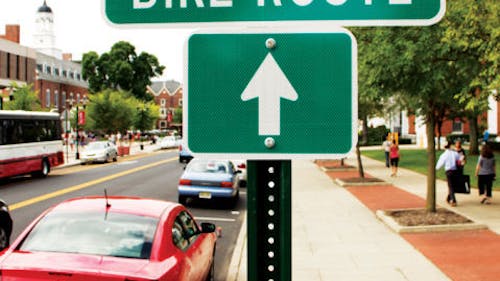City, University to collaborate on improving bike infrastructure

New Brunswick Councilman John Anderson has biked around the city all 60 years of his life.
“[I ride] an old ten-speed,” he said. “I have rode all over town without any problems, all different areas. But I do like the new bike lanes.”
Anderson is one of many New Brunswick residents taking advantage of recent improvements in bicycle infrastructure. The city has created new bike lanes and signs to ease transportation worries, while Rutgers works on programs to increase student awareness and use.
Glenn Patterson, director of Planning, Community and Development in New Brunswick, said the city has a high walk score, but they have been trying to make it better for cyclists with sharrows— signs to indicate a road shared between bikes and cars.
He said the new, shared lanes have been added for roads not wide enough for a separate bike lane, such as College Avenue. The city also put sharrows in the sixth ward and the fifth ward, where students often travel, and in the second ward.
The county is also looking into the construction of a bike lane that will go from the College Avenue campus to Douglass campus via Neilson Street, to be completed next fall or spring, he said.
“It’s fun, it’s fast, it helps to keep you in shape,” he said. “It’s much less stressful than sitting in your car and getting stuck in traffic and traffic signals.”
Meanwhile, Rutgers has hired three new employees and is initiating new programs to encourage student bike use, said Dorothy Le, senior transportation planner at the Rutgers University Department of Transportation Services.
In a recent survey of 900 students, 1.2 percent said they bike between campuses, she said.
“That’s actually a pretty decent start,” she said. “Usually for a city that hasn’t done much toward bicycling, most cities have been .25 and one percent bike commuters, so we’re really on par with most places.”
Among the most popular programs is the Rutgers Bike Rental Program, now in its third year, she said. For $10 per month or $25 per semester, students, staff and faculty can get cheaper access to bike routes and see if they want to invest in their own bicycle.
“In the first year, we didn’t really do much, but I think all 150 bicycles got rented within a few weeks,” she said. “The second year, we had a waiting list.”
Unfortunately, the program now has only 100 bikes in operation, since 30 of them are in need of repair and others have been stolen, she said.
The cost to replace a stolen bike is $410, according to the RUDOTS website. Students can register at bikes.rutgers.edu.
Meanwhile, Rutgers is in the process of redeveloping their map of student bike routes, which needs to be updated to reflect the addition of sharrows and other improvements on campus, she said.
“It shows the trails between and on the different campuses and all the trails that New Brunswick has jurisdiction over, and we’ve mapped the bike rack locations,” she said.
Rutgers often coordinates with the city about biking and pedestrian issues, she said. Only a few years back, the city and Rutgers considered closing College Avenue to all car traffic to allow more room for buses, pedestrians and bikers.
That idea never left the planning stages, but on Oct. 6, New Brunswick will open its streets to pedestrians and bicycles in an event called “Ciclovia.”
“Basically they open up the streets to solely pedestrians and bicyclists,” she said. “And what it does is it transforms our streets into parkways for walking and biking, even dance events, zumba, fitness classes, martial arts and food vendors.”
Multiple student groups and nonprofit organizations contribute to bicycling awareness in the city. One such organization is the New Brunswick Bike Exchange, established last May to raise funds for the Puerto Rican Action Board, said Leighann Kimber, a transportation planning assistant at RUDOTS.
“It’s an all volunteer organization that collects used bikes through bike drives and individual donations,” said Kimber, an Edward J. Bloustein School of Public Policy graduate student. “We have volunteers to repair and tune the bikes, then we sell them for affordable prices.”
So far, the exchange has sold about 60 bikes, some to Rutgers students, she said. The team also has many student volunteers helping repair the bikes.
“The great thing about this organization is that it’s run by the community and serves the community,” she said. “We consider Rutgers students to be a part of that community.”



